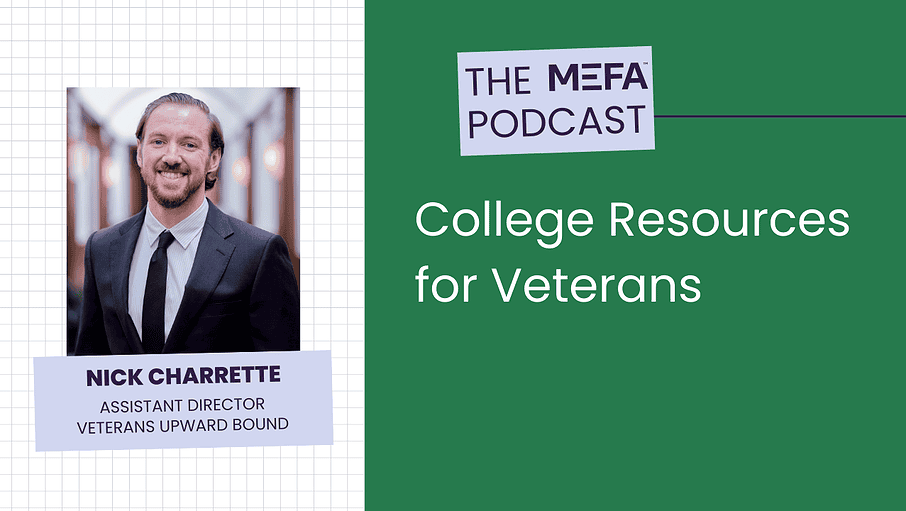

Resources Mentioned in this Episode
Please note that this transcript was auto-generated. We apologize for any minor errors in spelling or grammar.
Jonathan Hughes: Hi, everyone. Welcome to the MEFA Podcast. I’m Jonathan Hughes.
Julie Shields-Rutyna: And I’m Julie Shields-Rutyna.
Jonathan Hughes: So today, we’re going to be hearing from Nicholas Charrette, who is an Associate Director at Veterans Upward Bound based out of Boston. And he will talk to us about education’s benefits for veterans. Julie, you hosted Nick on a webinar on this very topic a few weeks ago.
Julie Shields-Rutyna: Yes, and I really enjoyed talking with him as well. There are so many pieces and so many programs available for veterans. It was great to have his expertise.
Jonathan Hughes: Yeah. It’s always an area of financial aid or college financing that, well let’s say, I’m always glad to have expert assistance on those programs. And of course, we’re recording this at the beginning of November and hopefully it’ll be out by Veteran’s Day. But if you are a veteran or have a veteran in your life that may want to go to college, you definitely want to stick around and hear that conversation because it was great.
And I learned a lot from it. But before that, Julie, for our first topic, I want to bring up another webinar that you hosted recently.
Julie Shields-Rutyna: Yes. And it was with Dr. Clantha McCurdy from OSFA, which is the Office of Student Financial Assistance here in Massachusetts. And the topic was Massachusetts state financial aid.
So that comes directly from the Commonwealth and it was really great. We talk a lot about federal and institutional aid, and it’s nice to also make sure that we keep people informed that there is Massachusetts aid as well. So lots of state-based programs and, you know, I think we’re going to be able to hear from Clantha, hear about the various financial aid programs.
And we’ll get to know some of those shortly, but before we do. I just want you to hear something that Clantha said about the amount of financial aid that’s available this year for students.
Clantha McCurdy: The information in our budgets this year, we have the largest financial aid budget in over three decades. In fact, on, we grew the financial aid budget by $20 million this year.
And the other individual line accounts are also either level funded or receiving a little bit more money. In addition to that, we spend about $60 million in tuition waivers or tuition credits. So we have essentially a $200 million program right now. And with that and the general scholarship, the $130 million program that funds a number of our programs, including the Mass Grant, which remains the, what I would call Flagship program, and it serves the largest number of students who demonstrate significant financial needs.
Jonathan Hughes: All right, so that’s good news.
Julie Shields-Rutyna: It is good news. We always like to hear about funding and increased funding. She talked a lot about the Mass Grant. That’s really the program that’s most widely used. So should we hear from her talk about that here too?
Clantha McCurdy: Mass Grant, our largest financial aid program, serves about 4,000 to 5,000 students a year. And as I mentioned, a student has to file the FAFSA, be a Mass resident, and be eligible for Pell in order to qualify. I am happy to say that for this year we received a significant increase in Mass Grant and we were able to increase the max award by $400 going from $1800 to $2,200 in one year. And that is significant because the majority of our students are getting that maximum award are in the very low EFC cell. So there are more students in the zero to 500 EFC cells getting Mass Grant than those above 501 and above. So we are helping students with the significant amount of aid this year.
Julie Shields-Rutyna: I will also note quickly that OSFA has added to that a Mass Grant Plus, and that’s an expansion of the Mass Grant program. It’s a pilot program, but it’s also very good news for students here in Massachusetts.
Clantha McCurdy: Mass Grant Plus, this is our pilot program. It’s very new right now at community colleges and the non-state universities.
And it is purposed to address unmet need for direct costs of tuition, fees, and books. And the award is determined after all other aides are accounted for. $7.3 million available this year at community colleges. And then of course, $10 million at the state universities. And you could be full or part-time, but the institution must prioritize this to Pell eligible students.
And here again, the part-time is that a minimum of at least six credits or more. We like to think of Mass Grant Plus as an extension of the Mass Grant program. And for that program, the deadline is November 1. So it allows the institutions a little bit more flexibility with who they can award that money too. And of course the institution is in control of it.
Jonathan Hughes: Yeah. We mentioned the Mass Grant and Mass Grant Plus now, and there are other programs that we’ll discuss. What do you have to do to apply for these programs?
Julie Shields-Rutyna: Yes. So I think sometimes families and students don’t understand this, that the main financial aid form, the FAFSA, which, you know, students use to apply for a federal financial aid.
That’s also what they use to apply for state aid, such as the Mass Grant. And if they’re eligible, they’ll receive that as part of their financial aid offer.
Jonathan Hughes: Is that the case with all Massachusetts state paid programs that all you have to do is file the FAFSA and you’ll be sort of run through for eligibility for any Massachusetts state aid program?
Julie Shields-Rutyna: Well, that’s such a great question. So for most state aid, yes, the FAFSA is the form that everyone needs to file and make sure you file it on time. So I would say most state aid is from that. However, not all. We don’t have time at this moment to go in depth on every single state program, but there are a few state aid programs that require some additional things.
So for example, there’s the John and Abigail Adams scholarship. And that is awarded to the top 25% of grade 10 MCAS scores in Massachusetts. And that is redeemable at public colleges and universities. So that helps cut the costs if a student is awarded that program. And then another program that you do have to specifically apply for with its own application is the Koplik Certificate of Mastery.
So for example, let’s hear Clantha talk about that one.
Clantha McCurdy: Koplik Certificate of Mastery, another waiver program, and as you know, students are invited to apply for that. That selection process is handled strictly by the Department of Elementary and Secondary Ed. But the Department of Higher Ed simply facilitates you awarding or accrediting of the tuition waiver benefit to students once they enroll in a public college. And for this, the student has to complete the FAFSA annually and maintain a 3.3 GPA.
Julie Shields-Rutyna: So now for, even for some of the programs, which you need to qualify or apply separately, you still have to complete that FAFSA. So even, I’ll just mention where that John and Abigail Adams scholarship is a merit based scholarship, but for processing and to make sure that goes through, students do need to file a FAFSA.
So, you know, that goes along with the talk that we have, Jonathan, all the time. Students, file your FAFSA. Because it will put you in the way of eligibility for so many programs and, make sure you do it before May 1st of the year before you’re planning to be a student, because that is the state financial aid deadline.
So I should also highlight two more programs. One is the Foster Child Grant. We sometimes get questions on what is available for those in foster care or children who are adopted. And another one is the department of children and families adopted child tuition waiver and fee assistance program.
So why don’t we hear directly from Clantha about those programs as well?
Clantha McCurdy: Foster Child Grant, just a reminder that this is a program for students who continue to be served by the Department of Children and Families. They are eligible for a $6,000 grant on this program. And the foster child grant is completely portable.
So a student can attend a college in Massachusetts or anywhere in the USA for that matter. And we are serving about 300 students a year on this program. The sister program to the foster child grant is the adopted and foster fee assistance, but only available to students who attend public institutions. And this is a full tuition and fee scholarship that’s a wonderful prorgram that the state has heavily invested in.
Now, early on, we didn’t have enough money to pay the full cost of tuition and fees for both semesters, but now that funding is available and we are supporting about 900 students each year. So as you can see, we have $7.4 million on this program. Student has to provide proof of their eligibility to the school, which they get from the Department of Children and Families.
And then once they’re in our system as being eligible, that remains, they never have to provide the proof any longer. And we can prepackage them, or the school can prepackage them, and then just submit to our office certification of their eligibility. So it’s a wonderful program.
Jonathan Hughes: All right. Well, that is a lot, there are frankly more programs that are given by the state than I was aware of.
And I’ll put a link to the webinar in the show notes where if people are interested, they can go and get a sort of more expansive look at everything that’s available. And even that’s not everything.
Julie Shields-Rutyna: It’s so true. So true. There’s so much there. And the other state program that I like to talk about is the MassTransfer program.
And so we’ve talked about that before, I think even on this podcast, but basically that’s the program where students can get an education here in Massachusetts by beginning at a community college, a two year institution, and then transferring to a four year university. And by going through that MassTransfer program, there are all kinds of ways that they can reduce costs.
There are tuition freezes and tuition credits. So on that state OSFA website, they can find out good information about the MassTransfer program as well. So once again, just file your FAFSA to be eligible for a lot of these programs
Jonathan Hughes: And for those programs that may require additional steps?
Julie Shields-Rutyna: The students can go to the OSFA website and that will list all of those scholarships and the forms that are needed for those.
Another place is to talk to their school counselors if they’re interested in those programs, because some of those require school counselor support.
Jonathan Hughes: All right. Well, I will once again, put a link to the webinar in the show notes so that people can access that and take a look at that information.
Now we head to the MEFA Mailbag and these are questions that have come into us from customers over the past two weeks and been answered by our college guidance experts. If you have any questions, remember, you can please reach out to us at [email protected] or you can call us at 1-800-449-MEFA.
Or you can meet us on social media, on Facebook/MEFAMA, at Twitter at @mefatweets, and Instagram at mefa_ma. And so today we have an international student question, and this person writes to us who is a U.S. citizen says, but my parents are from Nepal. They do not file U.S. taxes, but they do file Nepali taxes.
So I’m planning on applying to UC Berkeley, Cornell, and the University of San Francisco through the CSS Profile®. Where should I send my forms? Julie?
Julie Shields-Rutyna: Yeah. Well, I guess there’s a lot in this question. So John, you can join in too. I guess the first thing I would say is as a U.S citizen Saline, you are eligible to apply for all financial aid.
And so that means you should file a FAFSA as well. And the way you file a FAFSA if your parents are not U.S. citizens is that they can just put zeros in the social security question, and then they can transfer their income to U.S. dollars and then complete the form that way.
And they will have to print the signature page and manually sign it and mail it into the FAFSA. So that’s one thing. But then yes, the colleges that you’re referencing, who will need the CSS Profile form, you’ll also want to complete the CSS Profile form and you will want to do the same thing.
You want to have your parents, you know, do this, translate their income and assets into U.S. dollars and put that information on the form. The last thing I will say is that some colleges who require the CSS Profile may use some additional forms for international students. So you should check with the colleges and see if there are any special forms that could be used because your parents live elsewhere and have international income and all that. Just double-check in case there are some additional forms that you could use. Anything else you can think of John?
Jonathan Hughes: No, I was about to say, I don’t think I can add anything to that. So I hope that helps.
Remember if you have any questions you can call us up at 1-800-449-MEFA or email us at [email protected]. We have a bench of college guidance experts waiting to answer your call. Now let’s go to my talk with Assistant Director of Veterans Upward Bound, Nicholas Charrette.
Nicholas Charrette is an Associate Director at Veterans Upward Bound based out of Suffolk University in Boston. He’s an army veteran, and holds a bachelor’s degree in history, and spent his years in the army as a military police officer. He’s also an active member of the student veteran organization on campus. Nicholas, how are you?
Nick Charrette: Not too bad, Jonathan, how are you doing today?
Jonathan Hughes: Can you tell me first about your organization and can you tell me all of the services that Veterans Upward Bound can offer and to whom?
Nick Charrette: For sure. So Veterans Upward Bound is a Department of Education Grant. So we are not the only one, there’s about 60 of them around the country. They’re not really evenly spread out. Some states have more just because they have a higher concentration of veterans. But currently we’re the only one in Massachusetts.
And essentially the program is designed to really motivate and assist vets in making sure that they develop those academic and other skills that are going to be necessary not only for acceptance in a post-secondary education program, but sustained success. And the services that we offer are academic counseling, refresher, and remedial courses.
And when we talk about a refresh and remedial, I really liked to zero in on math and English, just because we gear the curriculum of these courses towards the placer So if you’re looking to enter a community college or UMass or a state school, it’s what they’re going to be testing you on. So we really gear the curriculum towards that.
Additionally, we run periodic financial literacy workshops, VA education and state education benefits workshops, or webinars, kind of like the one that we partnered with MEFA on. For some veterans, if you know, maybe they’re a little bit ahead of the course, you know, content that we offer. We can hire a tutor prior to them enrolling in school to help them maybe work on something that they’re deficient in.
Additionally we help veterans with college applications and other related items that are going to be needed for acceptance. So, you know, completing that FAFSA, making sure that you get your transcripts from your past schools, the joint service transcript, which is huge for veterans. And anything else that goes hand in hand with, you know, applying to and being accepted into school.
And you know, all of our services are completely free to eligible veterans. We do, you know, aim to serve, you know, mostly low income veterans, those who are first-generation college veterans, and those who are academically at risk. But as long as you don’t have a dishonorable discharge and you already don’t have a bachelor’s degree, we can help you out.
Jonathan Hughes: And how do veterans actually find you?
Nick Charrette: Sure. Yeah. So, there’s a few different ways you could find us. One of them would be to go on our website, which is vubma.com. So pretty much the Veterans Upward Bound VUB, MA for mass, .com. And we have a referral and application, inquiries page on there where you can just, you know, put your info in and we’ll reach out.
Additionally, you can find us on the Suffolk University website. And also, I don’t know if it’s possible, but I can, you know, Jonathan, I can give you my email and phone number to put in the description of the podcast as well. I have no problem with anyone just reaching out directly.
Jonathan Hughes: Yeah. We’ll put all that information in the notes and we’ll link to the webinar that you did as well, cause I think people would want to want to see that.
So, you know, watching that webinar, that’s all about VA education benefits. You mentioned that confusion can prevent a lot of veterans from pursuing their education. And can you talk about why that may be and, and what can veterans do to overcome that confusion?
Nick Charrette: Yeah, for sure. I know that you had mentioned a minute ago that, you know, even on your end it can be kind of confusing. It doesn’t, you know, it’s not just to those on the civilian side, veterans get really confused by this stuff too. You know, when veterans separate, you know, the Department of Defense does have programs for transition.
In the army, used to be called Soldier For Life, and then I believe they changed it to TAPS, which is the Transition Assistance Program. And I forget what the S is for, but essentially they wanted to let you know what the VA can do for you for education, employment, and all this other stuff before you leave. So that, you know, when you separate, you don’t feel lost and you know where everything is.
The kind of the problem with it sometimes is that while you’re doing these classes, you’re still on active duty and the mission comes first. So sometimes, you know, someone’s giving you all this great info in like an, you know, a one hour, you know, info session that you have to go to. And it’s just overload. And also you’re not really focused cause it doesn’t feel really yet.
What makes it a little, you know, even more confusing for people sometimes is that when vets separate, they may be eligible for two to three different benefits. And that alone is just, you know, what do I use now? Which one do I use? How do I apply for it? How do they work?
You know, they all pay tuition differently. Some of them have a books and supplies stipend. Some of them pay a housing allowance, and some of them, you know, kind of a mix of all of them, so it can get really confusing and overwhelming for vets. And, you know, specifically for the GI bill, which I’m sure we’ll talk about a lot through this discussion, a lot of vets who are separating right now are eligible for two GI bills.
And once you use one, it’s an irrevocable decision. You can’t say I used post 9/11 one and go to Montgomery and vice versa. And this makes, you know, making the right choice the first time around really, really important. Because depending on your goals, you know, where you want, if you’re going to go full-time or part-time and a bunch of other factors, one of them is always going to be better than the other.
And you know, in order to overcome this condition, you know, with, you know, that it’s just inherent with, you know, being a veteran trying to access your benefits. The biggest thing I could tell you is do your research and try and meet with your local Veterans Upward Bound.
Putting the numbers side by side and comparing them can really help them make the decision a lot more clear. And additionally Veterans Upward Bound is well-versed in these. So we can help you for your personal situation kind of figure it out.
Jonathan Hughes: Can you tell, tell us the difference between the two GI bills? You mentioned Montgomery GI Bill, and then the 9/11 GI Bill.
Nick Charrette: Sure. I’ll preface this whole answer to this question with, I’m going to try and just keep it high level, because there is a lot of different aspects, different factors and elements that make each specific situation different. And I’ll say it probably at the end of every answer I gave, is that your individual situation is individual to you. So make sure to do the research.
But you know, back to the two different GI Bills, there are other GI Bills, but generally in 2021, when someone refers to the GI Bill, they’re referring to either Chapter 30, which is the Montgomery GI Bill, and Chapter 33, which is the post 9/11 GI Bill. And again, for our purposes, you know, to stay out of the super specific stuff and really confusing people. We’re just going to assume that, you know, the veterans that we’re talking about in this situation are 100% eligible. Just because there are other elements that, you know, take your eligibility level down and whatnot, based on your time in service.
Jonathan Hughes: I have a quick question before you start on the Montgomery GI Bill. Is that the GI Bill, the sort of famous GI Bill that people talking about when the veterans got back from World War Two and, you know, they took advantage of the GI Bill. Is that the Montgomery GI Bill?
Nick Charrette: I believe so. Yeah. It’s had a few amendments, but it’s like the original GI Bill up until, I mean, if you put it in the historic sense like that up until recently, it has been the GI Bill. But post 9/11 GI Bill, obviously, you know, since the war on terror, has really changed the game a little bit, and we’re going to kind of break down the key differences on them.
So the main characteristics that really differentiate both from each other. For the Montgomery GI Bill, a veteran is eligible for it if they paid into this GI Bill in their initial entry training or basic training, whatever you want to call it for your branch. A lot of vets when I’m talking to them, they don’t remember if they did, they’re like, oh, I don’t remember. What does that payment look like?
Usually what I can, you know, get a veteran to remember if they did, was one of your first days at boot camp, you’re asked point blank, do you want to reduce your pay by a hundred dollars a month for 12 months for the GI Bill? And you either say yes or no. And that would make you eligible for the Montgomery GI Bill. The Montgomery GI Bill pays the veteran a stipend of just over $2,000 a month for every full month of training and education.
I just want to point out the keyword here is pays the vetran. The VA pays the veteran this month, every month, that you’re in school. This is the only payment that you get under the Montgomery GI Bill. There’s nothing specifically for housing, books. It’s just the Montgomery general stipend. With the stipend, the veteran has to pay the school their tuition and any other education related fees, including books, supplies, or any other fees the school may tack on.
If there is any leftover after you’ve paid your tuition, it is for the veteran to use as needed. So, you know, traditionally veterans would use it for rent or any other living expenses that they incurred while using the Montgomery GI Bill.
So moving to the post 9/11, it’s a little bit more involved. It’s a little bit, I don’t want to say complicated, there’s just more to it than just here’s your stipend, pay your tuition. For post 9/11 eligibility, it’s pretty easy to remember if you served after September 11th, 2001 you are eligible for it, or you were depending on if it’s expired or not, but it granted you eligibility for this GI Bill. A big thing that attracts veterans to this GI Bill and, you know, a massive upgrade over the Montgomery GI Bill was that this GI Bill granted you a housing allowance.
The way that this housing allowance is calculated is based on, it’s pretty much similar to what BAH or basic allowance for housing is for active duty members. So any veterans listening and they remember getting BAH, it’s pretty much the exact same thing, except it’s paid out at the pay grade of E5 with dependence. So it doesn’t matter if you’ve separated as a private, an airman, a Sergeant or you were Sergeant Major and beyond. Every single person using this GI Bill is subject to the same pay rate.
Additionally, veterans using this GI Bill are entitled to a book stipend of up to $1,000 per year. And the big thing that really differentiates it, besides that housing allowance is that the tuition under the post 9/11 GI Bill is paid directly to the school. So for a member of Montgomery, the VA would pay me the stipend, and then I would pay tuition. Under post 9/11, once I’m certified with my school, the VA will pay the school the tuition. And as far as tuition goes, if you go to a public school, community college, state school, your tuition is fully covered. And if you go to a private school, they will pay you up to around $26,000 per year.
One more thing about the post 9/11 GI Bill that really separates it from Montgomery is that, if you are a hundred percent eligible, as we said prior, you’re entitled to potentially participate in the Yellow Ribbon Program, which, if you go to a private school and let’s say your school costs $40,000.
But as I just said that the post 9/11 GI Bill will only pay 26. It’s a way to potentially help you fund that remaining $14,000 in tuition where, you know, your school and the VA and your contract to help you eliminate that remaining tuition.
Jonathan Hughes: It’s the yellow ribbon program?
Nick Charrette: Correct. And there is, again, it’s this world of, you know, all these different programs and whatnot, that kind of confuse people. With Yellow Ribbon, you can not use it with Montgomery, but it can be used with post 9/11.
Two more quick things I just want to say about the differences between them is that the Montgomery GI Bill is actually being phased out. So by 2030 will no longer be used. And, you know, I know everything I just said was a mouthful and it’s a lot, but I hope, you know, to just kind of pass on these key concepts of it.
And then if any veterans, you know, want to understand the key differences between them as it pertains to them. You know, Veterans Upward Bound, it’s a big part of what we do is helping you navigate these benefits.
Jonathan Hughes: Are there any examples when somebody would be perhaps, it would be in their interest to, you know, one or the other, Montgomery or 9/11?
Nick Charrette: Yeah, absolutely. And you know, generally if we meet a veteran who wants to go to school full time and they live in an area like high cost of living, the post 9/11 GI Bill is almost always going to beat out the Montgomery by virtue of your tuition’s covered. Don’t even worry about it.
And get this housing allowance that is more than enough to pay for rent because it’s based on the cost of living your zip code. There are some instances, you know, say a veteran wants to go to school part-time, specifically halftime or less. So generally at a college university, six credits or less. The Montgomery GI Bill sometimes is more beneficial to the veteran because another aspect of the post 9/11 is once you go to school half time or less, you don’t get a housing allowance. So you know, this new aspect to this cost analysis that we’re kind of doing between the two, because yeah, under post 9/11, when I go to school half time or less, my tuition is still paid, but I get no stipend or anything from the VA.
Under Montgomery, I may still have money left over after I paid that tuition. So in that case, it may be better for me. And then additionally, in places that have a really, really, really low cost of living, Montgomery is sometimes better just because of the housing allowance on their post 9/11 may not really add up.
So it is really specific, you know, to your situation. What I will say is if you’re a veteran in Massachusetts, 99% of the time, post 9/11 will be more beneficial to you.
Jonathan Hughes: Yeah. I can understand that. There is another program that you mentioned in the webinar that I want to talk about. And that is the VRE program, which is, I think, veterans readiness and employment.
Nick Charrette: Correct.
Jonathan Hughes: Okay. And can you talk about that and who would benefit from that program?
Nick Charrette: For sure. VRE is a program that’s been around for a while. It’s actually just rebranded by the VA. So if veterans listening are not familiar with it, it used to be called Voc Rehab up until sometime in 2020. So it’s the same program, it’s just got a, you know, a rebranding.
Essentially what VRE, you know, kind of their mission – it’s to help transitioning service members and vets who have a service connected disability and an employment handicap prepare for and obtain sustainable employment. VRE uses a few different ways to kind of achieve that, to help vets find that sustainable employment.
You know, one of them is the traditional college and university, but they can also preview to go to like a trade school or into an apprentice. And then there’s a few other ways that are really uncommon, so we usually don’t talk too much about them. But generally we’re seeing a veteran going to a college, university, trade school, or apprenticeship.
A big thing with VRE to keep in mind is that it is not an entitlement like the GI Bill is. With both GI Bills, if I’m entitled, if I opted into Montgomery or served after 9/11, I’m entitled to them. I can use them like, just by virtue of my service. VRE is different in the fact that you have to apply for it and be approved for it.
And you have a counselor who kind of, you know, is a part of your journey through that program as well. Another thing to keep in mind is that at its core, VRE is not an education program. It is an employment program. It’s a very big distinction that the folks at VRE have, you know, discussed with us cause you know, we work with the program a lot to help, you know, collaborate and make sure that vets are, you know, successful. But that’s a huge distinction.
It can fund your education, but it needs to be connected to sustainable employment. It’s the really big, you know, aspect of the program. There is some eligibility. Generally you have to have a 20% service connected disability through the VA or higher, and an employment handy.
Although, you can have a 10% service connected disability, but the employment handicap that you have has to be considered serious, which sort of just a higher level of handicap. And additionally, there is a basic period of eligibility of 12 years from the day that you separated from the military. But that can be extended, if again, going back to that serious employment handicap.
Jonathan Hughes: Thank you so much for talking about those programs. Are there any of the programs run either through the VA or maybe outside of the VA, but are open to veterans or those in the military community?
Nick Charrette: For sure. You know, often we run into veterans who, you know, were never eligible for post 9/11, cause maybe they separated in the late 90’s.
That also means their Montgomery GI Bill has expired and that they don’t have a service connected disability through the VA. So there’s no VA programs that are available to them at that time. What we usually do is explore the Massachusetts in-state tuition waiver for veterans. It’s a great program and it does not expire.
So if, as long as you have an honorable discharge, served over 180 days on active duty, and you’re enrolled in three or more credits at a state school or community college, you can participate in this waiver. The process is a little bit different than the GI Bill or VRE. The way that you apply for it is actually through your school.
Every school has a veteran rep in some like some other like liaison, someone who’s kind of the go-between between the state and the school working on veteran’s benefits. So they can help you apply for this. It is just a tuition waiver. I don’t want to say just, cause that’s still huge. But keep in mind, there is no housing, other stipends. And if there’s any fees, those are on you. But the tuition is completely waived, which is a huge benefit as well.
Additionally other, you know, non VA programs – although it’s, you know, generally further down our list, we do help our veterans all apply for FAFSA. Generally they’re not taking out student loans by virtue of having some sort of VA education benefit or that Mass in state tuition waiver. But we do help them do to the other benefits associated with FAFSA. And we also help veterans explore a plethora of scholarships that we have kind of compiled.
Jonathan Hughes: What are some of the most common questions or difficulties that veterans have with the FAFSA process and financial aid in general?
Nick Charrette: I think that the two biggest things that, you know, pertain to veterans and FASFA is – the first part is that they don’t apply because they don’t think that there’s any benefit. If you know, I have a hundred percent GI Bill, I don’t need FAFSA. And so they don’t understand the other benefits of it.
And two is, there’s actually a specific part of FAFSA, there’s a specific box in it as a part of the application that specifically pertains to veterans and really trips a lot of people up. So on that first part about veterans not even applying, you know, veterans often say, well, I have my tuition paid, I even have yellow ribbon, I don’t need student loans.
And we like to, you know, let veterans know that, you know, there’s other benefits of applying for FAFSA, depending on, you know, your taxable income and, you know, your family size and all that, you may be deemed eligible for grants. Typically, you know, Pell grants, you know, can really help veterans with living expenses during the off months.
Let’s think about traditional you know, course load, you know, fall and spring. That, you know, adds up to give or take eight months. If a veteran is planning on living off of their GI Bill, like for example, let’s use a veteran going to school in Boston full-time. They would be entitled to just over $3,000 a month in housing allowance for every full month they’re in school.
So in your head, you think, oh, that’s 12 months. That’s like $36,000. I could probably make that last the year. But when you factor in the school break in the winter and not going to school in the summer, that situation changes a lot. So, you know, we tell veterans, you could be eligible depending on, you know, your income and whatnot, for Pell grants that in those months you’re on school can really help you, you know, close the gap.
And additionally just helping, you know, financially and keep you secure so that you’re focusing on school and not worrying about, you know, where is my utilities bill coming from? Where’s my rent money coming from, whatnot. Additionally, we do sometimes see vets who may not be a hundred percent eligible.
Let’s say they’re 90% eligible. So every semester they’re going to have a small part of their tuition not covered by the VA. In that case, a veteran may need to take out a student loan. And in that case, we like to make sure that vets understand how to do so responsibility. You know, what’s the difference between a subsidized and unsubsidized loan, just so that, you know, everything that we’re doing, we’re doing, to put ourselves in the most advantageous situation, you know, financially and, you know, education and whatnot.
To the point about, my second point about, a specific part of FAFSA that pertains to veterans. The box is 44 G I believe. And it specifically asks about student untaxed income. This one used to trip me up a lot too when I was filling it out. But specifically when you look at, you know, the regulations on it and what they’re they want, they want you to report all of the money that you get from the VA except education benefits.
So if you’re getting housing allowance from your GI bill, you don’t report that. If you’re getting your tuition paid, which you are, you don’t report that. However, a lot of veterans who are, you know, using the benefits for their VA education benefits have VA disability. And that is something that you report, cause it is not a VA education benefit.
It’s, you know, other compensation from the VA and you would put that in this box. So, yeah, that one really does trip a lot of people up. So essentially what it comes down to is you have to on your FASFA report non-education benefits you get from the VA. But nothing you get as far as GI Bill or Voc-rehab Bill.
Jonathan Hughes: If there was something that you wish that every veteran knew about education after their service, what would that be? And conversely, if you could make other students who are not veterans aware of something regarding, you know, the veterans on campus, what would that be?
Nick Charrette: So I guess the one thing I would tell the veterans who haven’t used education benefits yet is that to really realize that, you know, we as a group have access to the greatest education benefits probably in the country. So I encourage everyone to take advantage of them and put yourself in position to obtain like a really more strong and sustainable career. And don’t be scared to reach out to, you know, a school rep, you know, the veteran rep at the school you want to go to, Veterans Upward Bound or anyone else. Just you know, if you don’t understand your benefits. Cause someone will help you understand them and they really are life-changing benefits.
I can attest to the power of them and what they can really do for you, your career, and your family and all that. One more quick thing on that as well is I really just want to hammer home that your education benefits are unique. So don’t just use post 9/11 because your buddy did, research everything you’re eligible for, research VRE.
Put them side by side and say, oh, well, this one will pay you this way and this one will pay this way based on, you know, how you know, where I go to school and, you know, my rate of pursuit. Individualize it to you and make sure you’re using the best benefit for your situation. And then the second question, can you repeat the second question, was that?
Jonathan Hughes: For other students.
Nick Charrette: Yeah, I think with other students that would be, you know, just know that, you know, veterans come from all different walks of life.
You know, I could speak from experience being the student veteran in class. You may not even know you’re sitting next to a veteran. I just think that, you know, understand that all veterans have a different experience. Not everyone went through the same thing, not everyone deployed. Some people stayed in the states the whole time. And understand that we all, you know, come with these, I think really valuable skills that translate to any classroom situation.
Jonathan Hughes: Veterans day is just around the corner, so I hope you have a good veterans day and thank you for being here and thank you for your service. And again, I really enjoyed this.
Nick Charrette: Appreciate it Jon. Thank you so much for having me.
Jonathan Hughes: All right. Well, that was our show, everyone. Julie, thanks again. Remember if you liked the show, please follow us on Spotify, Apple podcast, or wherever you’re hearing this. If you could do us an extra favor and give us a five-star rating, that would make us very happy indeed. Until next time, thanks a lot everyone.













